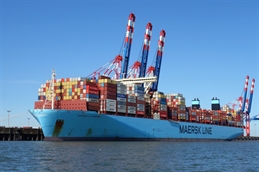
Top brass of Maersk have told industry audiences that the carrier’s relationship with forwarders has not been damaged by its push into logistics. The debate whether or not Maersk’s strategy constitutes a competitive threat to forwarders has been fired up by the public falling out ofthe company and DB Schenker.
After the shipping giant subsumed the business of its Damco forwarding brand under its corporate moniker DB Schenker made a very vocal play for Damco customers, offering them a ‘stability package’to shift short-term agreements over under the same terms that they had with Damco. Not much later,Maersk cancelled the forwarder’s key account status.
Maersk CEO Soren Skou declared himself “very comfortable” with the company’s relationship with forwarders. In an earnings call with analysts following the presentation of the third quarter results he dismissed suggestions that Maersk’s slip in market share during the period could be attributed to forwarder opposition to its integrator strategy of morphing into an end-to-end logistics player.
“We are very comfortable with our position with our forwarder customers. Our relative share of forwarding business has been constant for the last five years,” he commented.
He added that the company’s Spot quoting and booking platform is being used by forwarders, with some actually integrating it into their own portals.
In a podcast by booking and pricing platform Freightos, Adam Banks, the former chief technology and information officer of Maersk who left at the end of last year, also refuted claims that Maersk might be spearheading a charge by ocean carriers to disintermediate forwarders.
“I doubt there’s a carrier on the planet that wants to have 100,000 customer relationships,” he stated. Forwarders remain valuable for carriers as a point of aggregation for volumes from smaller shippers, he added.
The move into logistics allows a carrier like Maersk to utilize data that it has at its fingertips to offer more diversified services with better margins, he argued. Rather than try to displace forwarders,Maersk can develop products that better match shippers’ needs that forwarders cannot offer. It can sell multiple products on the same sailing, packaging different service elements for a range of offerings, such as guaranteed or express services.
The challenge lies in getting these differentiated services in front of shippers. Usually their shipping decisions are already made by the time the shipping line enters the picture. Establishing its own channels to shippers enables the carrier to enter the conversation at an earlier stage, Banks said.
Concentrating purely on the ocean leg reduces carriers to purveyors of a commodity that is ruled by cost, he reflected. Maersk management is targeting 7.5% ROI, which appears to be unattainable on pure ocean transportation.
The company’s stated goal is for non-ocean revenues to generate half of its business.In the earnings call Skou said that the logistics business is going to become the growth engine of Maersk.Direct sales to shippers have increased.
In the first seven months of this year 69.3% of Maersk’s import trade volume to the US came directly from shippers. That share stood at 63% in 2016, when the company unveiled its integrator strategy.
Other container lines also own forwarders, which does not appear to have impacted their relations with the forwarding community, but DB Schenker management has argued that Maersk’s transformation goes a lot further and positions the company as a competitor.
Eytan Buchman, chief marketing officer of Freightos, finds that thescope of capabilities that the company has acquired goes a long way beyond a forwarding subsidiary. The seamless integration of its traditional core business with forwarding, customs clearance and inland transportation capabilities could marginalize part of the role normally carried out by global freight forwarders, he warned.
“The decision to internalize Damco, acquire a large fulfillment company and purchase two large customs brokers are quite startling wake-up calls that the line between carriers and forwarders has blurred,” he said
By Ian Putzger
Correspondent | Toronto



